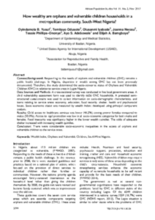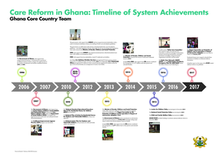childrens_living_arrangement
Displaying 91 - 100 of 136
This study determined the socio-economic status of Orphans and Vulnerable Children (OVC) in relation to service areas in Lagos Nigeria.
Lagos government has announced its concerns about institutionalization and the state's consideration of a review of adoption processes to address current practice gaps.
This infographic provides a historical timeline of the alternative care reform process in Ghana, marking key achievements in the establishment of policies, guidelines, procedures, and programs to improve the quality of care and protection for children without adequate family care.
This chapter explores how the failing system of traditional almajiri education, challenges associated with government efforts to integrate almajiri education into the formal school system, social exclusion and hostility contribute to increase the boys’ vulnerability to radicalisation and recruitment by Boko Haram.
The Association of Orphanages and Homes Operators in Nigeria, ASOHON, made an appeal to federal and state government leaders for technical support to improve children's homes in rural areas.
Kogi State Commissioner for Women and Social Development, Mrs. Bolanle Amupitan gives warning to children's homes facilitating illegal adoptions and those keeping children who have become adults to attract more funds from donor agencies. Baby homes are increasing, with 706 children still unclaimed in the 18 registered orphanage homes in the state.
Children orphaned by Boko Haram Islamists are overcrowding the city of Maiduguri, Nigeria, whose population has doubled to over two million due to those seeking shelter from the conflict.
Street children in Nigeria face risks of being recruited by terrorist organizations. This program held by American University of Nigeria hopes to reduce children’s risks of recruitment.
This article presents the achievements of a care and support programme among orphans and vulnerable children (OVC) in Bayelsa State, Nigeria as well as the implications for future programming.
This paper presents achievements and implications of care and support programmes among OVC in Kogi State, Nigeria



